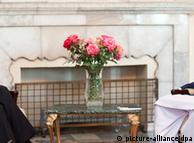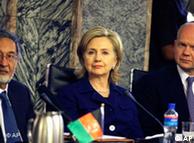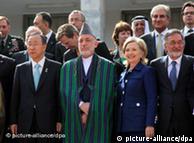......urity responsibility by 2014: Kabul conference Major world leaders attended the Kabul meeting The
AFGHANISTAN | 20.07.2010
Afghans to take over security responsibility by 2014: Kabul conference
2014 has been mentioned as a date for Afghans to take over responsibility for their security before. But this is the first time it has been officially set as a target for the international community and the Afghan government. German Foreign Minister Guido Westerwelle, who was in Kabul for the conference, emphasized that 2014 was not a definite pullout date.
"When we talk about handing over responsibility for security in 2014, this does not mean the same as an exit. It shows that we want to speed up reconstruction in the country to bring stability. But it also shows that it is not a mission that is going to last forever."
 German Foreign Minister Guido Westerwelle talking to Afghan President Hamid Karzai in Kabul on Tuesday
German Foreign Minister Guido Westerwelle talking to Afghan President Hamid Karzai in Kabul on Tuesday
Doubts about feasibility
Many observers believe that the setting of this date has been driven by the domestic concerns of Western governments, who need to demonstrate to their electorates that this is not an open-ended mission. Given that more international troops died in fighting the Taliban during the first half of 2010 than ever before since 2001, it seems questionable whether the Afghan security forces can be boosted enough to control the insurgency on their own, Germany-based Afghanistan expert Mehraj Amiri told Deutsche Welle.
"With all their superior weapons, the international forces have not been able to defeat or even control the Taliban. How is the Afghan army, which will still need quite long before it can act on its own, supposed to do it? Afghanistan hasn't been able to build a powerful army for the last nine years, and it won't be able to do so in the next three years either."
 US Secretary of State Hillary Clinton at the conference
US Secretary of State Hillary Clinton at the conference
At the conference, US Secretary of State Hillary Clinton sought to dispel fears that the Afghan soldiers would be left alone. "We are working around the clock to strengthen Afghanistan's security forces. With our Afghan partners we are on the offensive in parts of the country where the insurgents have gone unchallenged for too long, and we are matching our military efforts with an unprecedented civilian surge to help create stronger institutions and economic development."
More aid to be channeled through Kabul
The one-day conference, which was attended by delegates from about 60 countries and major international organizations, pledged to channel at least 50 percent of international aid through the Afghan government within two years. Kabul had insisted to have more control over how aid money is spent. The meeting also backed the Afghan government's plans to reach out to Taliban insurgents who renounce violence.
It was the first time since 2001 that a major international Afghanistan conference was held in the country itself. Despite draconian security measures, UN Secretary General Ban Ki-moon's arrival was delayed when his plane had to be diverted following a rocket attack.
Author: Thomas Baerthlein
Editor: Disha Uppal

Comments